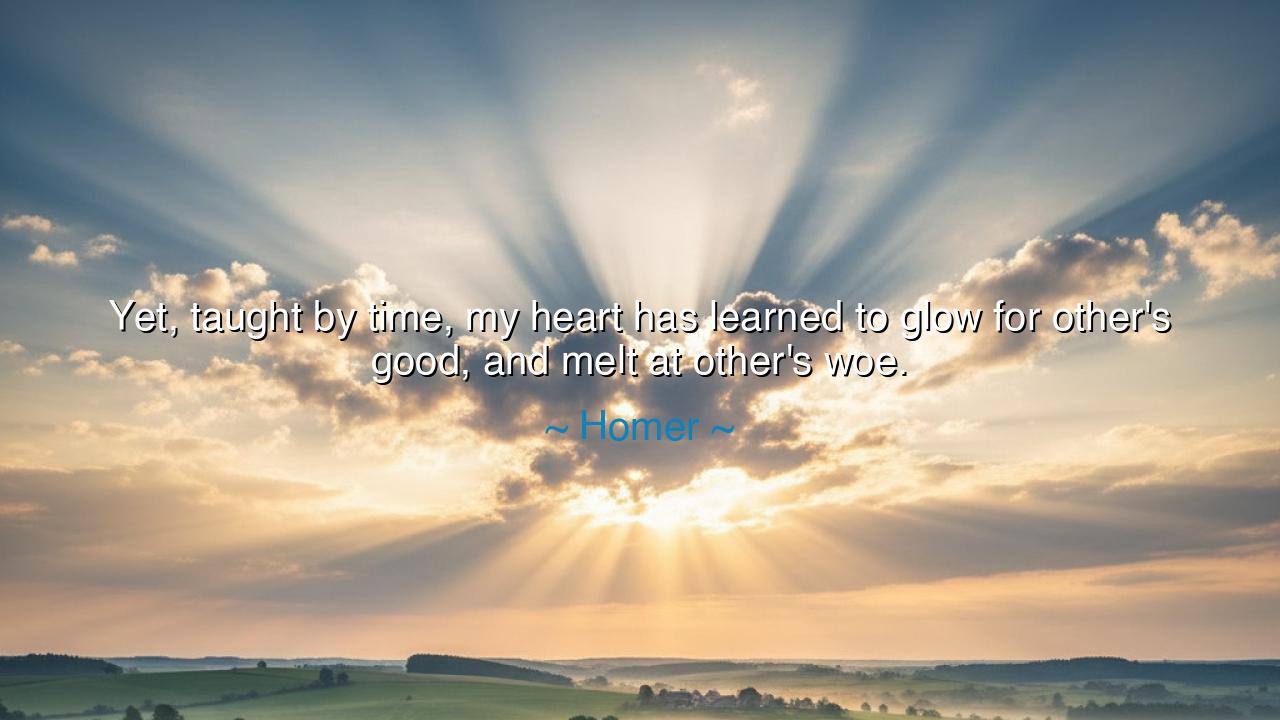
Yet, taught by time, my heart has learned to glow for other's
Yet, taught by time, my heart has learned to glow for other's good, and melt at other's woe.






The words of Homer, “Yet, taught by time, my heart has learned to glow for other’s good, and melt at other’s woe,” rise like the voice of an elder who has journeyed through the storms of life and returned bearing wisdom. They speak of a heart once perhaps hardened by battle and sorrow, now softened by the long hand of time. It is the confession of a soul that has learned compassion not through ease, but through the hard tutor of experience. For only those who have suffered, who have seen both triumph and grief, truly understand the value of another’s joy and the weight of another’s pain.
The origin of these words lies in the ancient epics, where Homer, or the tradition that bore his name, sang of heroes and their fates. In the Iliad and Odyssey, war and wandering are ever-present, and the human heart is tested beyond measure. Yet, amidst tales of spears, ships, and storms, there also shines a deep thread of empathy. Odysseus weeps when he hears the bard sing of Troy, not only for his own trials but for the shared sorrows of men. Achilles, though fierce and wrathful, is moved to return Hector’s body to Priam after witnessing the grief of a father. Time, in Homer’s telling, teaches even the mightiest that strength without compassion is emptiness.
To glow for another’s good is to rejoice in the triumphs that are not our own, to lay aside envy and instead kindle the light of fellowship. To melt at another’s woe is to let the sorrow of others pierce the armor of our indifference, to allow tears to flow for suffering that does not directly touch us. Homer’s wisdom tells us that the heart, with time, must expand beyond the narrow self, for only in shared feeling does humanity reach its true stature. The warrior who cares only for his own victory is soon forgotten; the one who shares in the pain and joy of others is remembered as noble.
Consider the story of Abraham Lincoln, who led his people through the cruelest division of their history. His cabinet and generals saw only war, yet Lincoln wept often in solitude for the lives lost on both sides. In the evenings, he would visit the hospitals, sitting quietly with soldiers, reading to them, or simply holding their hand. Though commander-in-chief, his heart was not steel but flesh, glowing for the good of freedom and melting at the woe of countless mothers and sons. His greatness was not merely in strategy, but in compassion shaped by the time and sorrow of his own life.
The meaning of Homer’s teaching is this: the heart is not born wise, but grows wise through the passing of years and the witnessing of life’s tides. In youth, one may chase glory, wealth, or power, but in maturity, the spirit learns that what truly matters is connection. To live only for oneself is to live in a desert; to feel for others is to drink from a river that never runs dry. Compassion is not weakness, but the highest strength—for it binds people together, and in that binding lies survival and hope.
The lesson we must take is clear: do not harden your heart against the joys and sorrows of others. Let time teach you, not into bitterness, but into tenderness. When your neighbor prospers, rejoice as though it were your own gain. When your friend mourns, let your heart bend low to carry a share of their grief. This is not sentiment but the true labor of the soul, for to feel with others is to become more than one—it is to join in the great tapestry of humanity.
Practical action flows from this teaching. Each day, pause to notice the lives around you: offer congratulations without envy, comfort without judgment, and presence without condition. Volunteer where there is suffering, celebrate without restraint where there is joy. Make it your practice to let your heart glow and melt often, for such practice refines the soul. Over time, you too will find that compassion, once a choice, becomes your nature.
Thus, in the voice of the ancients we declare: Blessed are those whose hearts have been taught by time, for they carry the fire of joy and the waters of mercy. Blessed are those who glow for another’s good, for they spread light in a darkened world. Blessed are those who melt at another’s woe, for they mirror the divine compassion that binds creation itself. This is the wisdom of Homer, passed from age to age, calling us to awaken the full measure of our souls.






AAdministratorAdministrator
Welcome, honored guests. Please leave a comment, we will respond soon